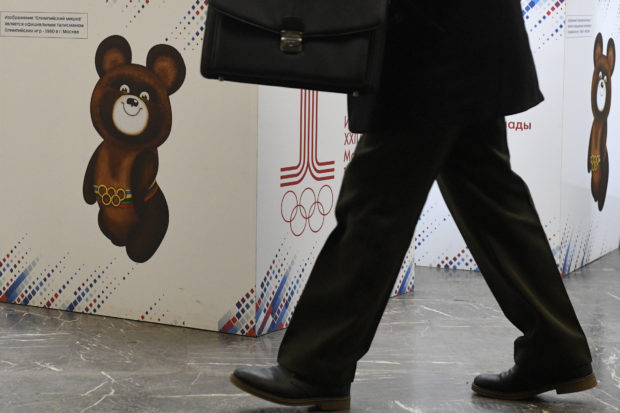Russia handed two-year doping ban in ‘catastrophic blow to clean sport’

A man walks at a hall of the Russian Olympic Committee headquarters decorated with images of the 1980 Moscow Olympics mascot – Misha the bear – in Moscow on December 9, 2019. – Russia will miss next year’s Tokyo Olympics and the 2022 Beijing Winter Games after the World Anti-Doping Agency on Monday banned the powerhouse from global sporting events for four years over manipulated doping data. (Photo by Alexander NEMENOV / AFP)
LAUSANNE, Switzerland – Sport’s highest court on Thursday banned Russia from the international stage for two years, including the Tokyo Olympics next year and 2022 Beijing Winter Games, but the halving of the initial punishment was blasted as “a catastrophic blow to clean athletes and the integrity of sport”.
The Court of Arbitration for Sport’s ruling cut a four-year ban for systematic doping imposed by the World Anti-Doping Agency (WADA).
“This Panel has imposed consequences to reflect the nature and seriousness of the non-compliance…and to ensure that the integrity of sport against the scourge of doping is maintained,” said CAS in its judgement.
The statement added: “The consequences which the Panel has decided to impose are not as extensive as those sought by WADA.
“This should not, however, be read as any validation of the conduct of RUSADA (Russia’s anti-doping watchdog) or the Russian authorities.”
The ban runs until December 16, 2022, so includes football’s World Cup finals in Qatar which ends two days later.
Under the decision Russians will still be allowed to compete, but only as neutrals if they can prove no connection to doping.
– ‘Catastrophic blow’ –
The CAS decision sparked widespread condemnation.
“USADA acknowledges the devastating decision…in the Russia case that hands WADA and clean athletes a significant loss,” US Anti-Doping Agency chief executive officer Travis Tygart said.
“At this stage in this sordid Russian state-sponsored doping affair, now spanning close to a decade, there is no consolation in this weak, watered-down outcome,” he added.
He called it “a catastrophic blow to clean athletes, the integrity of sport, and the rule of law”.
Tygart added in an interview with AFP that the CAS ruling was a “tragedy” for the global fight against drug cheats, slamming the decision as a “weak and loophole-riddled outcome.”
The Global Athlete body said: “The fact that Russian Athletes can compete as ‘Neutral Athletes from Russia’ is another farcical facade that makes a mockery of the system.”
“If athletes from Russia can still compete, it is not a sanction. Russia has not been banned; they have simply been rebranded.”
However, Mikhail Bukhanov, acting head of Russia’s anti-doping agency RUSADA, said: “Today’s results are a victory for Russia.”
“The court decided not to accept the theses that WADA demanded. Of course, this is a significant precedent,” he added.
The CAS verdict followed a four-day arbitration hearing between WADA and the Russian Anti-Doping Agency (RUSADA) at a secret location last month.
The showdown, in front of three CAS judges took place following WADA’s decision last year to declare RUSADA non-compliant after the Russian body was accused of manipulating drug testing data.
WADA President Witold Banka hailed the ruling from the Lausanne-based CAS.
“WADA is pleased to have won this landmark case,” Banka said adding that the verdict has “clearly upheld our findings that the Russian authorities brazenly and illegally manipulated the Moscow Laboratory data in an effort to cover up an institutionalised doping scheme.”
Russia considered its ban to be legally indefensible.
Russian President Vladimir Putin slammed the decision at the time as a “politically motivated” ruling that “contradicted” the Olympic Charter.
The Russian saga erupted in 2016 when Grigory Rodchenkov, the former head of Moscow’s anti-doping laboratory, blew the whistle over state-backed doping at the 2014 Winter Olympics hosted in the Russian Black Sea resort of Sochi.
– ‘Nonsensical’ –
Rodchenkov’s lawyer slammed the halving of Russia’s sporting ban, describing the ruling as “nonsensical.”
In a statement, Jim Walden said the CAS decision to cut Russia’s ban from four years to two showed the tribunal was “unwilling and unable to meaningfully deal with systematic and long-standing criminality by Russia.”
After Rodchenkov’s bombshell accusations and barely two weeks before the 2016 Rio Olympics in July that year, WADA called for Russia to be banned from those Games.
The IOC, however, stopped short of an outright ban and said individual federations would decide whether to allow Russian athletes to compete.
In 2017, the IOC banned the Russian Olympic Committee from the 2018 Pyeongchang Winter Games, but allowed clean Russian athletes to take part as neutral competitors.
A total of 168 Russians eventually competed.
– Doping-tainted –
In September 2018, WADA controversially lifted its ban on RUSADA, despite not having been granted access to its doping-tainted Moscow laboratory.
Russia finally handed over lab data to WADA in January 2019.
In yet another twist, in September last year WADA gave Russia three weeks to explain “inconsistencies” in the data.
Sport’s global doping policeman then hit Russia with the four-year ban over the manipulated data last December.
Athletics’ global governing body meanwhile has given the Russian federation until March next year to produce a comprehensive plan to fight doping and be reinstated to the sport, or face expulsion.
While Thursday’s CAS verdict was of paramount importance to Russia, WADA also had plenty on the line.
The organisation, founded in 1999, has been criticised by US lawmakers over its handling of the scandal and failure to implement governance reforms.
The US as a result has threatened to pull its annual $2.7 million financing.
Thursday’s announcement was being awaited with interest by the International Olympic Committee and sports federations who were expecting clear directives from CAS, eight months before the Tokyo Olympics.